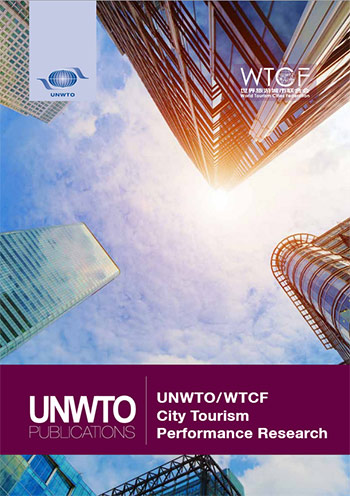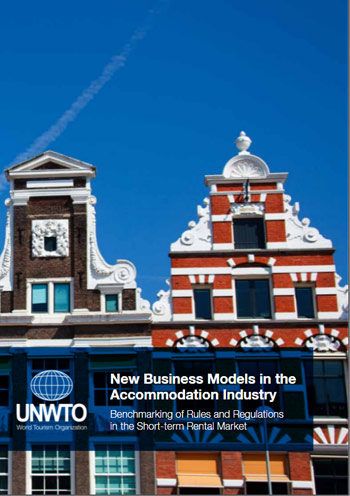Turismo urbano
Según ONU Turismo, el turismo urbano es “un tipo de actividad turística que tiene lugar en un espacio urbano con sus atributos inherentes caracterizados por una economía no agrícola basada en la administración, las manufacturas, el comercio y los servicios y por constituir nodos de transporte. Los destinos urbanos ofrecen un espectro amplio y heterogéneo de experiencias y productos culturales, arquitectónicos, tecnológicos, sociales y naturales para el tiempo libre y los negocios".
Según las Naciones Unidas, en 2015, el 54% de la población mundial vivía en ciudades y, para 2030, se estima que la cuota alcanzará el 60%. Junto con otros pilares clave, el turismo constituye un componente central de la economía, la vida social y la geografía de muchas ciudades del mundo y es, por lo tanto, un elemento clave de las políticas de desarrollo urbano.
El turismo urbano puede representar una fuerza motora del desarrollo de muchas ciudades y países y contribuir al progreso de la Nueva Agenda Urbana y los 17 Objetivos de Desarrollo Sostenible, en particular el objetivo 11: Lograr que las ciudades sean más inclusivas, seguras, resilientes y sostenibles. El turismo está intrínsecamente vinculado al modo en que se desarrolla una ciudad y ofrece más y mejores condiciones de vida a sus residentes y visitantes.
Desplegar el potencial del turismo como herramienta de desarrollo sostenible y crecimiento inclusivo para las ciudades exige un enfoque que incluya múltiples niveles y múltiples agentes, basado en una estrecha cooperación entre las administraciones turísticas y de otros ámbitos a distintos niveles, el sector privado, las comunidades locales y los propios turistas. De igual modo, el desarrollo y la gestión sostenibles del turismo en las ciudades han de integrarse en la agenda urbana general.
Eventos
8th Global Summit on Urban Tourism "Smart Cities, Smart Destinations" 7th Global Summit on Urban Tourism 6th Global Summit on Urban Tourism 5th Global Summit on City Tourism 4th Global Summit on City Tourism 3rd Global Summit on City Tourism 2nd Global Summit on City Tourism Global Summit on City Tourism
Conference on City Breaks: Creating Innovative Tourism Experiences

Mayors Forum for Sustainable Urban Tourism
3rd edition Mayors Forum for Sustainable Urban Tourism (Madrid)
2nd edition Mayors Forum for Sustainable Urban Tourism (Porto) 1st edition Mayors Forum for Sustainable Urban Tourism (Lisbon)

Recomendaciones de la OMT sobre turismo urbano
Estas recomendaciones se derivan de una serie de cumbres de la OMT sobre turismo urbano celebradas desde 2012, la Declaración de Lisboa sobre Turismo Urbano Sostenible, adoptada en el Primer Foro de Alcaldes de la OMT para un Turismo Urbano Sostenible, celebrado en Lisboa (Portugal) el 5 de abril de 2019, así como de los estudios llevados a cabo por la Secretaría de la OMT en el ámbito del turismo urbano.
Estudios
UNWTO-WTCF City Tourism Performance Research
The UNWTO/WTCF City Tourism Performance Research brings forward an analysis and evaluation of success stories in urban destinations. The results were collected by experts who applied the methodology created for the initiative through the realization of field visits and interviews of local tourism authorities and the main stakeholders. The publication based on case studies from 15 cities, provides in-depth understanding of each individual city and has the objective to enable other cities to learn from the progress they have achieved in order to enhance their performance, competitiveness and sustainability.
‘Overtourism’? – Understanding and Managing Urban Tourism Growth beyond Perceptions
The management of tourism flows in cities to the benefit of visitors and residents alike is a fundamental issue for the tourism sector. It is critical to understand residents’ attitude towards tourism to ensure the development of successful sustainable tourism strategies. This report analyzes the perception of residents towards tourism in eight European cities – Amsterdam, Barcelona, Berlin, Copenhagen, Lisbon, Munich, Salzburg and Tallinn – and proposes 11 strategies and 68 measures to help understand and manage visitor’s growth in urban destinations. The implementation of the policy recommendations proposed in this report can advance inclusive and sustainable urban tourism that can contribute to the New Urban Agenda and the Sustainable Development Goals.
This second volume includes 18 case studies across the Americas, Asia and the Pacific and Europe – Amsterdam, Antwerp, Barcelona, Berlin, Besalú, Cambridge, Dubrovnik, Edinburgh, Ghent, Hangzhou, London, Lucerne, Macao (China), New York, Lisbon, Seoul, Porto, Prague and Venice – on how cities are implementing the following eleven strategies: 1. Promote the dispersal of visitors within the city and beyond; 2. Promote time-based dispersal of visitors; 3. Stimulate new visitor itineraries and attractions; 4. Review and adapt regulation; 5. Enhance visitors’ segmentation; 6. Ensure local communities benefit from tourism; 7. Create city experiences that benefit both residents and visitors; 8. Improve city infrastructure and facilities; 9. Communicate with and engage local stakeholders; 10. Communicate with and engage visitors; and 11. Set monitoring and response measures.
This research is a result of a partnership between the World Tourism Organization (UNWTO) and IPSOS. To better manage the issues arising from the growing tourism demand in urban destinations it is essential to understand resident's experiences and perceptions on city tourism. The research aims at understanding the perception of residents towards city tourism, its impacts, as well as the most adequate strategies to manage the growing tourism flows in cities.
Several factors explain the growth of the so-called “sharing economy” in the tourism sector over recent years, including the 2010 global economic crisis, digitalization and new trends in travellers’ behaviour and preferences. This growth has been particularly notable in the accommodation industry. With the emergence of online platforms for short-term rentals, the market has been expanding at an unprecedented rate.
Building upon UNWTO’s 2017 publication New Platform Tourism Services (or the so-called Sharing Economy) – Understand, Rethink and Adapt, this report provides an analysis and benchmarking of 21 case studies in terms of the rules and regulations applied to the short-term rental market, focusing on three key areas: 1) fair competition; 2) consumer protection; and 3) planning and sustainability.





